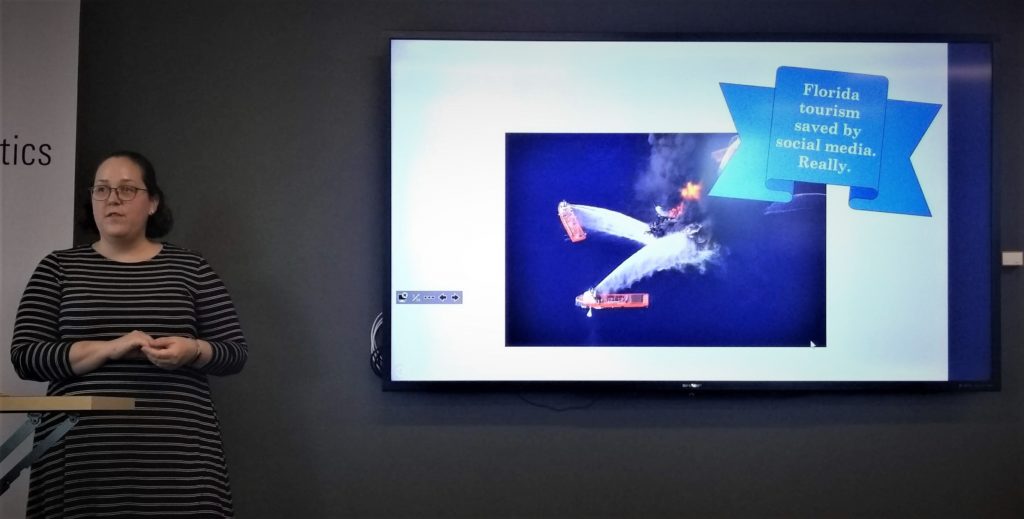Crisis Management in the Tourism Industry; Dr. Ashley Schroeder Presents
go.ncsu.edu/readext?641490
en Español / em Português
El inglés es el idioma de control de esta página. En la medida en que haya algún conflicto entre la traducción al inglés y la traducción, el inglés prevalece.
Al hacer clic en el enlace de traducción se activa un servicio de traducción gratuito para convertir la página al español. Al igual que con cualquier traducción por Internet, la conversión no es sensible al contexto y puede que no traduzca el texto en su significado original. NC State Extension no garantiza la exactitud del texto traducido. Por favor, tenga en cuenta que algunas aplicaciones y/o servicios pueden no funcionar como se espera cuando se traducen.
Português
Inglês é o idioma de controle desta página. Na medida que haja algum conflito entre o texto original em Inglês e a tradução, o Inglês prevalece.
Ao clicar no link de tradução, um serviço gratuito de tradução será ativado para converter a página para o Português. Como em qualquer tradução pela internet, a conversão não é sensivel ao contexto e pode não ocorrer a tradução para o significado orginal. O serviço de Extensão da Carolina do Norte (NC State Extension) não garante a exatidão do texto traduzido. Por favor, observe que algumas funções ou serviços podem não funcionar como esperado após a tradução.
English
English is the controlling language of this page. To the extent there is any conflict between the English text and the translation, English controls.
Clicking on the translation link activates a free translation service to convert the page to Spanish. As with any Internet translation, the conversion is not context-sensitive and may not translate the text to its original meaning. NC State Extension does not guarantee the accuracy of the translated text. Please note that some applications and/or services may not function as expected when translated.
Collapse ▲Dr. Ashley Schroeder, an assistant professor at Penn State University, visited the NC State University campus in November to give a presentation on crisis management in the tourism industry. Planning ahead is always a good idea, but with worsening natural disasters, planning will save lives and money. Additionally, large storms and extreme weather are hitting our wallets hard; it is estimated that the economic cost of natural disasters has increased +684% since 1970, costing $149 billion a year in 2016.

Dr. Ashley Schroeder explains to the audience the role of media in crisis response and recovery.
Media is playing an important role in informing and communicating within communities. However, media also influences how visitors view a destination. Places recently slammed with dangerous weather conditions or in the news for severe storm damage can create a frightening image with tourists. There are also some tourists who purposely seek exotic and high-risk areas that need protection during a time of crisis.
A contemplative silence came over the room when Dr. Schroeder asked the audience, “imagine someone out of state or out of country visiting coastal North Carolina. When a storm is approaching, community members know what to do, but who is making sure tourists know how serious it is and if they need to get to safety?”
That is a challenge for the tourism industry and a major aspect of Dr. Schroeder’s work; communicating real and perceived risks without scaring visitors. Planning for crisis does not just mean anticipating threats, it also includes response and recovery efforts so that communities can get back to normal and tourists are safe to visit the area.
Destination Management Organizations (DMO) have been looked at as an aid to the solution because of their broad reach across the tourism industry. It could also be an opportunity for organizations to use marketing and social media outlets to creatively and effectively craft messages that are informative about risks.
Unfortunately, it has also proven difficult to get politicians on board because of their lack of understanding of the tourism industry and the power it holds with visitors and communities. Pure Michigan, an extremely successful DMO, has recently been slashed from their state budget, reminiscent of a similar cut in Colorado’s tourism marketing in 1993 resulting in billions of dollars in lost revenue annually. In additional to potential revenue, it will be important for communities to inform politicians in order to remain resilient and to protect tourist safety, particularly as natural disasters worsen.
Still curious about crisis management in tourism? Check out the World Travel & Tourism Council page for information on preparedness, response and recovery.


